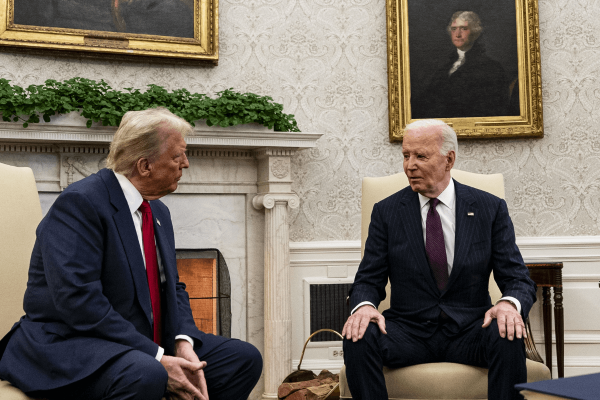Throughout the past four years, many on the political right spread the big lie that the 2020 election was stolen from Donald Trump — never mind that courts repeatedly found no evidence for this claim. They also incited fears, without evidence, of a vast conspiracy underway to steal the 2024 presidential election; Trump himself took to social media on Election Day to spread a baseless claim about cheating in Philadelphia. Yet when the results came in last week showing that Trump was likely to win, the claims of election fraud faded almost immediately. While this double standard is frustrating, I also see a more hopeful opportunity to rebuild shaken trust in our election system and make protecting everyone’s freedom to vote a nonpartisan cause and bipartisan commitment.
As a person of faith, I am deeply concerned about what the outcome of this election means, especially for those who will be most vulnerable to threats of mass deportations, retaliation against perceived political enemies, and other actions planned by the incoming administration. Yet we must not follow the example set by the president-elect and his followers: We can and should acknowledge the recent election results as legitimate, even if we are pained by them. I am hopeful that we can use this moment to break the fever of election denialism and rebuild trust in our election system — a shift that will be critical for future elections. Equally critical will be our commitment to advance justice and peace, a commitment that requires us to roundly reject the siren songs of violence, conspiracy theory, and anti-democratic methods.
Truth and transparency
Here is what we know about the integrity of the 2024 election: Despite some isolated incidents, including a few non-credible bomb threats against some polling places, the Cybersecurity and Infrastructure Security Agency made it clear that it had “no evidence of any malicious activity that had a material impact on the security or integrity of our election infrastructure” (emphasis mine). Despite results that went against them politically, the Biden administration assured voters that the election was fair and safe.
In acknowledging the integrity of the election, however, we can also acknowledge the larger context in which the election occurred, including things that concern us. As troubling as these issues might be, we need to stick to the facts and recognize that we don’t have evidence that they altered the overall result.
For example, in advance of the election, the Brennan Center for Justice, a nonpartisan law and policy center, tracked new voting legislation in states around the country, including at least 63 laws that made voting more difficult and at least 168 laws that made voting easier. While it’s tricky to know the full impact of all these laws, I’m listening to voting protection experts such as Lauren Groh-Wargo of Fair Fight Action, based in Georgia, who said she didn’t believe the state’s new voting restrictions changed the outcome of the presidential election there. But even as we continue monitoring the impact of these laws, we can still be clear about what evidence supports: Voter fraud is largely a myth that has been used to justify new and unnecessary barriers and restrictions to voters; we must oppose new restrictions.
The 2024 election also occurred within the context of increased political funding from wealthy donors, a trend that could corrupt and further undermine confidence in our electoral process. This trend points to the long overdue need for campaign finance reform. This trend of “megadonor” funding was true for both candidates, but especially for Trump. One worrying example was how Elon Musk, the world’s richest person, invested more nearly $119 million of his own funds to boost Trump through a political action committee — a bet which seemed to pay off when Musk’s Tesla stock holdings gained more than $15 billion after Trump’s victory. He also backed a controversial $1 million voter giveaway, the legality of which some campaign finance experts and politicians have questioned. But while Musk’s contributions are worrying, we must also resist jumping behind conspiracy theories such as the false narrative that Musk used his Starlink satellite internet technology to rig the election for Trump — something the Biden administration and state election officials have taken pains to debunk.
Foreign influence in the 2024 election included polarizing messages spread by Kremlin-backed sites, attempts by China to sway voters away from candidates China disliked, and Iranian hackers who stole and tried to leak Trump campaign materials to U.S. media. On Election Day, many of the bomb threats sent to polling locations across several of the swing states could be traced to Russian email domains. We should be concerned about this influence, even as we are grateful that experts do not believe that these interference efforts changed the outcome.
In future elections, we can (and will!) work to reverse these and other concerning trends, including threats against poll workers. But for now, we need to grapple with the fact that Trump is predicted to have gotten about 2 million more votes than Harris and carried every major battleground state — votes he won legitimately.
Losing elections, keeping and strengthening democracy
Even given robust evidence that the 2024 election was fair, there have been some on the left who have questioned the legitimacy of the election. Fortunately these claims have been muted and diffuse, limited almost entirely to social media.
There’s a key difference here: Election denialism hasn’t picked up nearly the same kind of institutional backing from the media, political leaders, and, yes, church leadership that we saw on the right after the 2020 election. Where Trump started and maintained the big lie of a stolen election, refusing to give a concession speech, Vice President Kamala Harris conceded the election once the results were clear, saying that “a fundamental principle of American democracy is that when we lose an election, we accept the results.” President Joe Biden, for his part, pledged his administration to full cooperation with Trump and his team to assure a smooth transition of power.
These examples of moral leadership immediately put the brakes on the kind of denialism that so corroded confidence in our system over the past four years. We should also take heart at how many of Harris’ supporters are now accepting the reality of Trump’s victory, no matter how much it angers, saddens, or alarms them – that is responsible and moral citizenship.
Regardless of any election outcome, our allegiance to God always needs to come before any partisan or political allegiance. Otherwise we risk committing idolatry. Likewise, our commitment to build a better, more just United States should come before our preference for a particular political team or the policies they support. No matter how much we disagree with Trump, we cannot use the same tactics he has used —sowing seeds of doubt, alleging fraud, attempting to overthrow results, etc. — if we wish to build a more just future. Audre Lorde said it best: “For the master’s tools will never dismantle the master’s house. They may allow us temporarily to beat him at his own game, but they will never enable us to bring about genuine change.”
I also believe this principle should inform how we spend the next four years with Trump once again in the White House. Our democracy isn’t something we do on one day every two or four years; it’s much bigger than elections. And our work to strengthen that democracy includes safeguarding institutional checks and balances, creating a vibrant civil society, ensuring a free press, protecting individual and minority rights, upholding the rule of law, and more.
We need to continue practicing democracy, even as the Trump administration threatens many of the democratic norms and systems we hold dear. Voting is only one tool that we have at our disposal. Nonviolent protest, which at times must include civil disobedience to unjust laws and systems, is also a critical form of engagement in our democracy. So are local organizing, mutual aid, and grassroots education and engagement with school boards, city councils, citizen oversight boards, and much more.
In this moment, we should neither catastrophize nor downplay the threats to democracy that we may face, especially given what Trump has promised to do in a second term. While I continue to pray for Trump and the incoming administration he is assembling, his second term will test our faithful commitment to justice and peace.
This week I’ve been re-reading and reflecting on Hebrews, particularly Hebrews 11, where the author writes: “Now faith is confidence in what we hope for and assurance about what we do not see” and shares the testimony of what a great cloud of witnesses from throughout the Bible were able to withstand and overcome by faith. The author goes on to say: “Therefore, since we are surrounded by such a great cloud of witnesses, let us throw off everything that hinders and the sin that so easily entangles. And let us run with perseverance the race marked out for us, fixing our eyes on Jesus, the pioneer and perfecter of faith” (Hebrews 12:1-2).
While our hope may be bruised and battered, we can renew our hope by putting our faith into action to both resist injustice and build the Beloved Community. After we get the rest we need, let’s work in solidarity with each other — especially with those in the most-vulnerable situations — to make sure we can look back and say with confidence that by faith we co-labored with God and each other to defend the vulnerable, protect everyone’s human dignity, and push our nation toward becoming an inclusive and just multiracial democracy.
Got something to say about what you're reading? We value your feedback!







